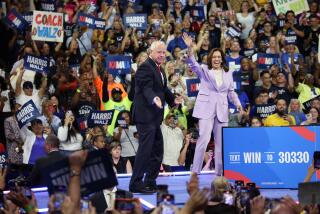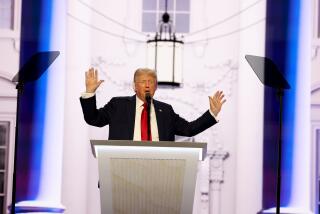The Heaviest Load Is for Kerry Alone
- Share via
BOSTON — For three days, Democrats have built a frame for their nominee. Now, John F. Kerry has to fill in the picture.
From the Rev. David Alston, a Kerry crewmate in Vietnam, to vice presidential nominee John Edwards and a procession of retired generals Wednesday night, Democrats have systematically portrayed their candidate as principled, politically courageous, optimistic, forward-looking and, above all, tough and decisive enough to protect America in a turbulent time.
But many analysts agree that praise may quickly fade in voters’ minds unless they see those qualities in Kerry when he stands before them, alone, in his acceptance speech tonight.
“There needs to be a more intimate kind of portrait,” said David Axelrod, a Democratic media consultant. “He needs to leave here as a fully formed figure in the eyes of the voter ... and that is something he largely has to do himself.”
Senior Kerry aides, although cautioning that decisions could change at the last moment, said he was unlikely to detail significant new positions today on key issues such as Iraq. That means the speech’s success is likely to turn on Kerry’s ability to establish personal connections with voters that build trust in him as a leader.
One thing this convention has shown is how great a priority each side places on defining Kerry’s leadership qualities.
In a drumbeat repetition, Democrats contend that Kerry’s performance under fire in Vietnam proves he can handle the pressures of command. His crewmates “saw up close what he’s made of,” Edwards said Wednesday night. “Decisive. Strong. Is this not what we need in a commander in chief?”
By contrast, on Wednesday, Republicans released an 11 1/2- minute video that they said showed Kerry shifting his position on Iraq in response to political pressure.
“His own words refute the notion that he is a strong and decisive leader,” said Ed Gillespie, the Republican National Committee chairman.
This war of words will continue for months. But it may be settled mostly by the judgments voters make from their most important direct exposures to Kerry, at the debates this fall and in his speech tonight.
Heading into his speech, Kerry has crossed some important personal thresholds with the public, polls show. But other challenges remain.
In a Times Poll released last week, nearly three-fifths of voters said they believed he was qualified to serve as commander in chief -- a showing most analysts consider impressive for a challenger. And in a poll released Wednesday by the University of Pennsylvania’s National Annenberg Election Survey, Kerry led Bush on several key variables among the fifth of voters who said they could still change their minds in the race. Pluralities of these voters rated Kerry more caring and more knowledgeable than Bush, and less reckless, stubborn or arrogant.
But Bush still held a solid lead, especially among the undecided voters, on which candidate would be the stronger leader. And in the recent Times Poll, voters were much more likely to identify Kerry than Bush as someone who flip-flops on issues.
The Democrats this week have worked relentlessly to bolster Kerry’s credentials on both fronts -- as a man of principle, and especially as a strong leader who can be entrusted with the nation’s security.
The most common theme from Democrats this week has been that Kerry’s military past shows he can handle a crisis as president.
With somewhat less fervor, several have tried to argue that Kerry has displayed similar qualities of courage and commitment in his Senate work.
In a third major theme, Democrats have insisted that Kerry will be just as strong as Bush but more thoughtful and less ideological, especially in foreign affairs. In the convention’s most compelling phrase, former President Clinton distilled that case Monday when he declared, “Strength and wisdom are not opposing values.”
Even some senior Republicans agree Kerry is making progress on these fronts. After this week, “the president has to win this election; he can’t hope that John Kerry is going to lose it,” said one leading GOP strategist familiar with White House thinking. “We have a burden to make our case. We’re not facing [George] McGovern or [Michael] Dukakis.”
But in other ways, the convention’s first nights may have made less progress -- and defined the challenge for Kerry today.
One area where Republicans and some independent analysts contend Democrats have made relatively small gains is in humanizing a candidate often derided as aloof and remote.
The convention has effectively spotlighted one set of Kerry’s personal relationships by highlighting the continued loyalty he inspires among many of his crewmates in Vietnam.
Jim Wasser, the radar man on one of the Swift boats Kerry commanded, offered perhaps the most vivid testimonial when he hushed a raucous veterans’ caucus this week by saying: “If John Kerry would come up to us today and said that he had one more Swift boat mission, and we were going to hell, he would have a full crew.”
But the speakers have been much less successful at illuminating Kerry as a father, spouse, friend or neighbor. The speech Tuesday by his wife, Teresa Heinz Kerry, was surprisingly impersonal, emphasizing his public policy positions more than private moments that might present her husband in a fresh light.
The Democrats have also struggled to make Kerry’s Senate record relevant to their portrayal. That has led Republicans to insist that Kerry has been forced to reach back 35 years to Vietnam to find an attractive element of his career.
Edwards added almost nothing on either of those fronts, in a speech where he sometimes sounded hurried and at times even nervous.
So far, speakers have also made only limited progress, many analysts say, on explaining Kerry’s agenda at home and abroad.
Although Edwards almost certainly advanced that cause with his extended discussion of Kerry’s domestic and national security proposals Wednesday night, he offered less detail on one key subject: what Kerry might do next in Iraq.
Four senior Kerry advisors said Wednesday they didn’t expect his speech to offer new proposals on Iraq. “It’s not objectively possible,” one said. “There is nothing you can say on Iraq other than that we’ve got into a real mess and we can’t walk out without creating a bigger mess.”
Revealing a more personal side of himself, showing a continuity between his military heroism and his political career, and providing voters a clearer sense of his domestic and foreign policy plans are some of the challenges that remain for Kerry, even after all the speakers who preceded him.
And as he prepares for his speech, Kerry may wonder if the ground is shifting a bit under his campaign. As the focus has shifted onto the Democrats with the convention and the selection of Edwards this month, most surveys have shown Kerry narrowly leading Bush. By a variety of measures, most polls have also shown a majority of Americans open to changing direction.
But several recent surveys have shown Bush’s job approval rating slightly improving as Iraq slips more from the front pages; among persuadable voters in the Annenberg survey, Bush’s approval rating rose from 44% last month to 50% now, placing him right at the level that has historically separated winning, from losing, incumbents.
Kerry probably will strengthen his position at this convention, but if these trends continue, Bush could soon look stronger as well. Even after this enthusiastic send-off, Kerry faces a long march through difficult terrain. And with all of this week’s testimonials behind him, he must now cross that ground largely alone, starting the moment he steps onto the podium tonight.
More to Read
Get the L.A. Times Politics newsletter
Deeply reported insights into legislation, politics and policy from Sacramento, Washington and beyond. In your inbox twice per week.
You may occasionally receive promotional content from the Los Angeles Times.









